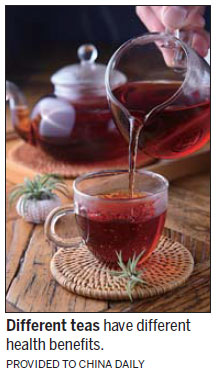Tea brews up myriad health benefits
For 10 years I worked as a food reporter for China Daily. During that time, I received many compliments from people for not gaining weight, despite my frequent restaurant visits. I believe that this is partly due to tea, which has helped my digestion and prevented high blood sugar.
When tea was first consumed several thousand years ago, it was used as a medicine and was only consumed as a drink after the Tang and Song dynasties (618-1279).

Shennong, the mythical Chinese ancestor, is thought to have taught the ancient Chinese people about agricultural practices and the use of herbal medicines, including tea. He tasted hundreds of grasses to find the proper grains, but became frequently ill due to ingesting toxins. It was said he found tea leaves were good for detoxification.
Lu Yu (733-804), China's "tea saint" from the Tang Dynasty (618-907), wrote in his monograph The Classic of Tea that tea not only quenches the thirst and dispels heat, but also lifts the spirits, relieves headaches, dry eyes and discomfort in the limbs and joints. It is best suited for people who are "frugal and make vigorous progress (at self-cultivation)".
Plenty of modern studies and research have been conducted to examine the chemical constitution and health functions of tea. The main chemical elements in fresh tea leaves, apart from around 75 percent of water, include tea polyphenols, such as EGCG (epigallocatechin gallate), organic acids, vitamins (especially vitamin C in green tea), alkaloids (such as theine) and amino acids.
Tea polyphenols can eradicate free radicals. They have anti-aging, anti-radiation, anticarcinogenic and anti-bacterial properties. Tea alkaloids can excite the brain and heart, and theine can help with digestion.
In green tea extracts, researchers have found four aspects of biochemical properties - antioxidant, anticarcinogenic, anti-inflammatory and anti-radiation.
Despite their many health benefits, different teas have different degrees of benefit. According to Chen Ke, a Traditional Chinese Medicine qualified tea expert based in Beijing, every tea has a medicinal function, but some teas are more effective because they are stronger, with the three strongest being - pu'er large-leaf tea, Fenghuang Dancong and northern Fujian's heavily fried oolong "rock tea".

One should also take into account both the time of year and one's own specific physical condition when choosing which tea to drink. Zhao Yingli, a Beijing-based tea scholar, wrote in his book Wisdom of Tea Drinking that different teas are suitable for different seasons.
Zhao wrote that in spring the chi in the liver needs to rise, and he recommended very aromatic teas for that purpose, such as Fenghuang Dancong, a Guangdong oolong, and jasmine tea. To dispel heat and quench the thirst in summer, green tea is recommended, while one can also try Tieguanyin, a southern Fujian oolong, Taiwan's high-mountain oolong and raw pu'er aged for more than three years. He also recommended the strong and aromatic "rock tea", for autumn, and black tea and matured pu'er to warm oneself up in winter.
Green tea and white tea are relatively cold in nature and suitable for those with vigorous constitutions who feel hot all the time. Oolong is medium fermented and ideal for most people. Red tea is relatively warming and is also suitable for those with a weak stomach. Black tea, which is quite warming, is better when aged and can help the body digest grease, especially after eating meat.
It is worth noting that, despite the great number of health benefits, regular tea drinkers who like to consume strong teas need to replenish their reserves of calcium and consume carbohydrates. That's because, theoretically, the organic acid in tea can react with calcium compounds and hamper the body's ability to absorb calcium. This theory is backed by the fact that some people complain about suffering calf spasms during sleep following heavy tea consumption. In this instance, it is recommended to drink milk or eat beancurd to replenish calcium levels.
On the other hand, too much theine in very strong teas such as pu'er and oolong can lower blood sugar levels too quickly and cause weak limbs and even dizziness. This state is also known as "tea drunkenness".
Some people also complain about not being able to sleep after drinking tea in the evening. This is caused by the theine content in tea. However, teas such as black tea and matured pu'er have relatively small amounts of theine due to high-levels of fermentation. As a result, one can drink these teas, even in the evening, to help with digestion and therefore help with sleep.
Contact the writer at yejun@chinadaily.com.cn
(China Daily 07/23/2016 page10)














